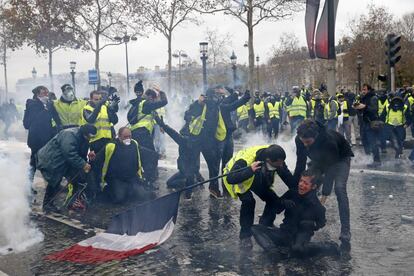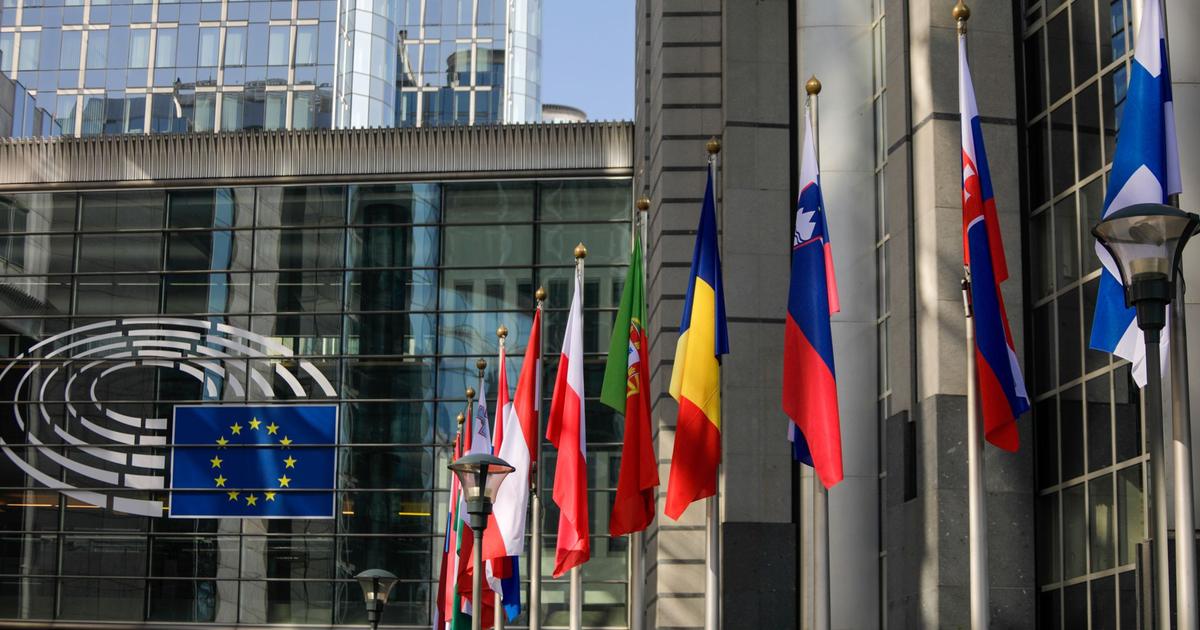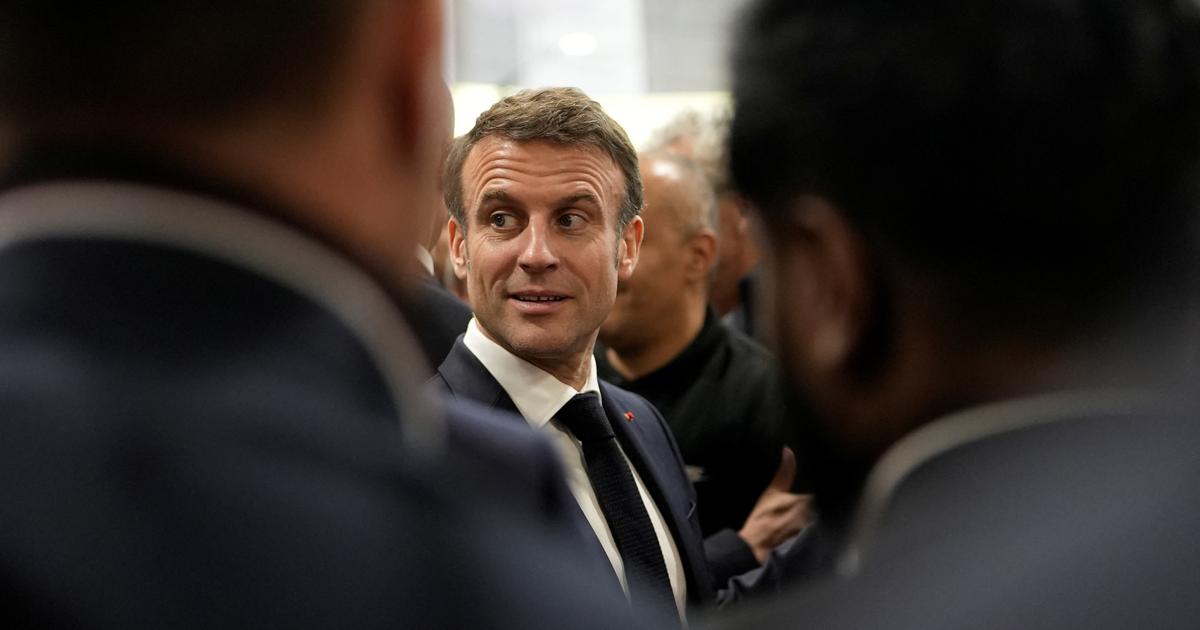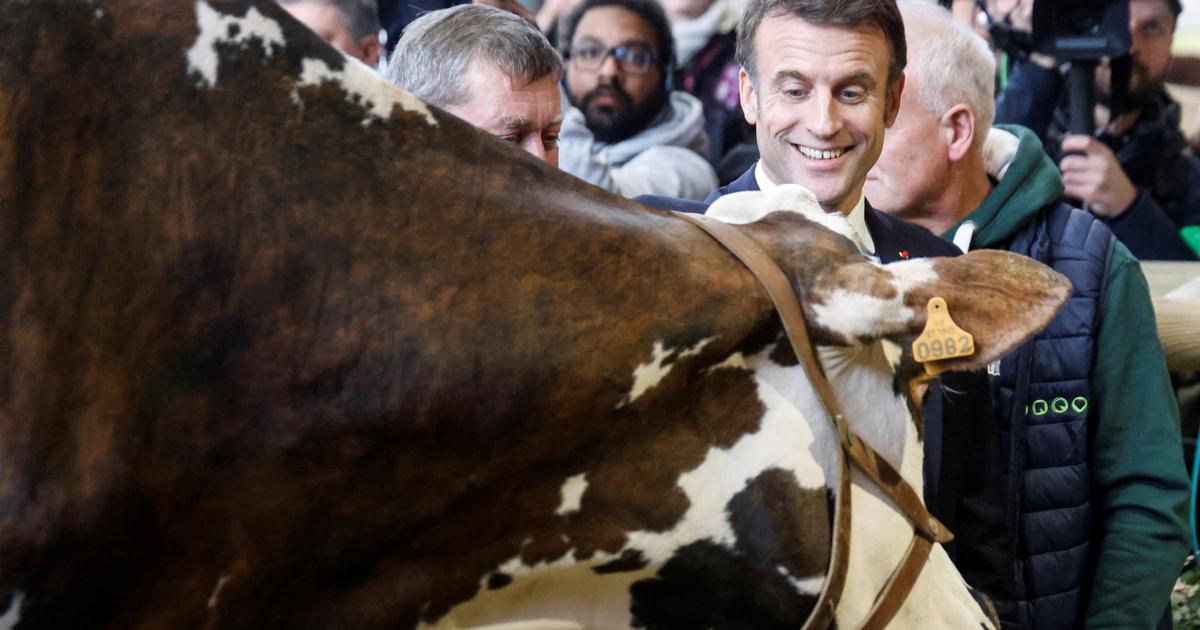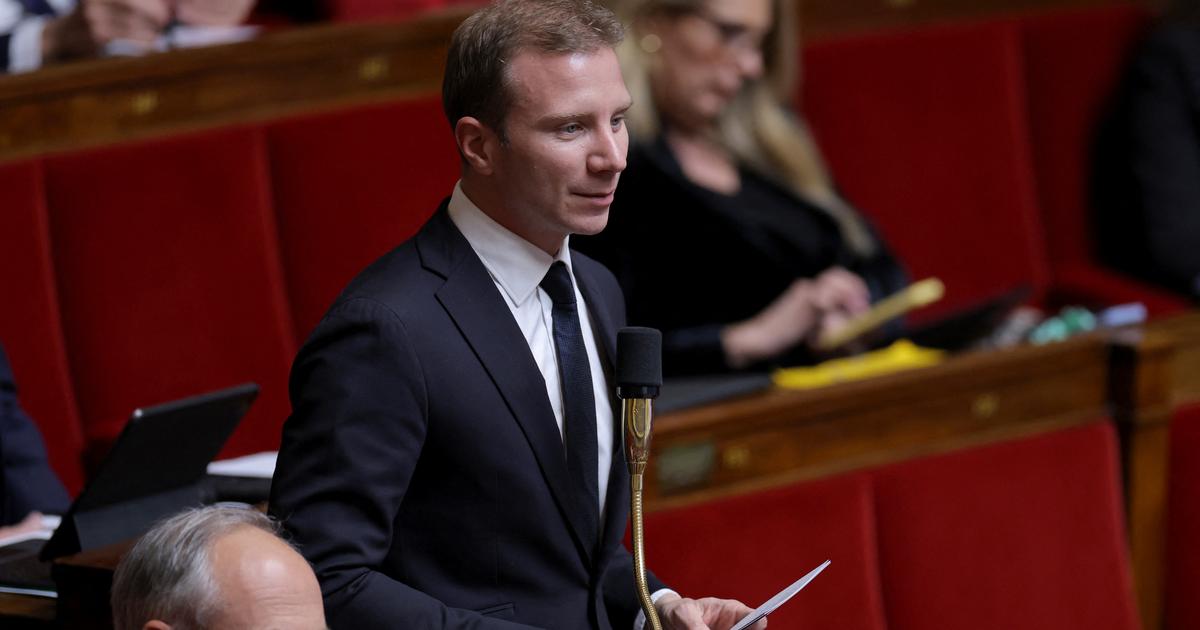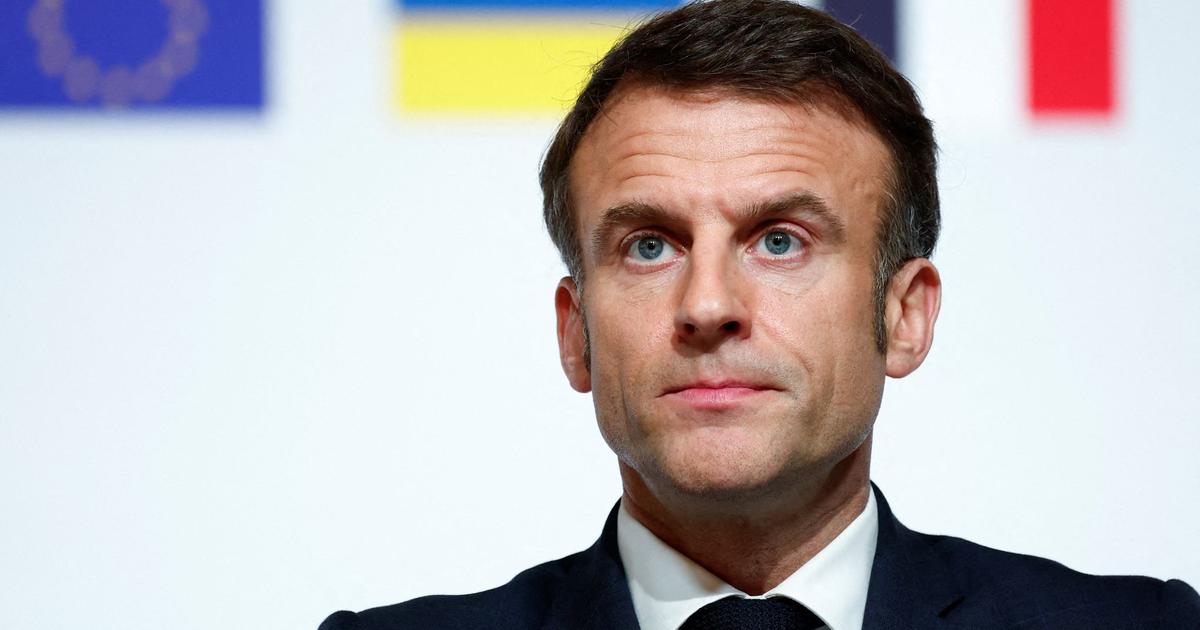"After five years of Macron in power, do you think you are capable of defining what macronism is?"
The question, posed by the host of the popular political talk show
Quotidien
to a panel of editorialists just weeks before the first round of the presidential election on Sunday, is somewhat perplexing.
And yet, it is on everyone's lips.
One more time.
It is as if the time that has elapsed since the election of the youngest president in the history of France (39 years in 2017), champion of the motto "neither right nor left" and who assumed a fierce will to blow up the old world of political parties traditional, has not been enough to clearly define the essence of Emmanuel Macron's policy.
Macronism, adventure Yaël Goosz, head of the political service of public radio France Inter, is "permanent crisis management."
For Ruth Elkrief, a journalist for the LCI television channel, Macronism is, above all, "a form of energy, volunteerism and reactivity."
A style then and not an ideology?
A pragmatism, as many of the president's supporters seem to think?
Or an absolute vacuum, as journalists Gérad Davet and Fabrice Lhomme suggest in a recent investigative book in which they profile the president through dozens of interviews?
Even former Prime Minister Edouard Philippe tried at the time to define what Macronism was... without much success: "It is the project of an emancipated France and real solidarities, of a powerful France in a strong Europe."
Although the character and his praxis seem to escape any attempt to be framed in traditional political categories, they do reflect, however, a certain vision of the world, of social bonds and of the exercise of power.
A reformist president on the throne
Emmanuel Macron, during the ceremonies of his inauguration as President of the Republic in May 2017. Charles Platiau (Afp / getty)
Macron presented himself in 2017 to his voters as an opportunity for change after two mandates, those of Sarkozy and Hollande, which the former director of
Le Monde
Éric Fottorino described in 2018 in the magazine
Le 1
as "disappointing".
The only certainty of the movement he led, The Republic on the Move, still under construction and without a defined ideology, was that a new world had to be established.
In his opinion, the traditional political system was obsolete to the extent that it prevented the individual from emancipating himself and exercising real rights in a globalized economy, perceived not as a threat, but as an opportunity.
“With Macron, for the first time in a long time, the possibility opens up for France to make up for lost time and initiate bold reforms to slim down that adipose state that, like a hydra, slows down and regulates its productive life to exhaustion,” he opined in these pages the Nobel Prize for Literature Mario Vargas Llosa before his election.
At the beginning of the legislature there were opinions for all tastes in this regard.
While France Inter editorialist Thomas Legrand observed that "the vocational training plan has not yet been launched, the integration of peripheral neighborhoods has not been financed (...), we continue to seek real measures of equality", the Ana Fuentes and Timothy Garton Ash analysts for this newspaper extolled the vigor of the new president to address transformations: “Macron aimed high torpedoing the sacred cows.
The reform of the labor market has made hiring and dismissal more flexible, setting a cap on severance pay,” Fuentes wrote in 2018. A clash of visions that, four years later, has reached a midpoint.
Few observers doubt the existence of a will to reform,
Les Echos:
"Although some reforms (labour, education...) have been carried out, others (pensions, institutions...) have been abandoned."
When it comes to the electoral program of the
candidate president,
widely
criticized for not having really campaigned (he has rejected the debates with the other candidates and opted to offer a single large rally), most analysts have been somewhat disappointed and "little convinced by a catalog of measures without much coherence" , as
Nouvel Obs
summarized
this
same week.
Perhaps the most recurrent criticism of Macron has been his inability to restore democracy to its dynamism, contrary to his campaign promise, through a greater involvement of civil society in policy making, which was to reconcile somehow the citizens with their rulers.
The president has opted from the beginning for a style of vertical power, a “hyperleadership”, as Andrea Rizzi defined it in a 2019 column, reinforced by a party without real internal democracy and by a Parliament that, according to
Les Echos
, has continued to weaken throughout the five-year presidential term.
Thus, an editorial in this newspaper stressed in August 2018 the opposition's weariness with a style of government and a conception of the presidential role that "goes much further than the already marked presidentialism of the French political system."
It is, according to
Le Monde,
a practice with a strong symbolic monarchical charge, far from its initial intentions.
Three articles on this question:
Macron,
by Mario Vargas Llosa (May 2017).
The Macron enigma,
by Máriam Martínez-Bascuñán (February 2017).
The 'ni-ni' candidate,
by Máriam Martínez-Bascuñán (April 2017).
A president disconnected from the popular classes
A demonstrator is treated after being injured during a 'yellow vests' protest in December 2018 in Paris.
“In the small world of The Republic on the March, there is no candidate, but a
boss
and some
helpers
.
Processes
directed
bottom up
are followed
and, above all, not
top down;
we talk about
conf call
,
insider
and
outsider
”.
These phrases from 2017 by the then director of the newspaper
Libération
, Laurent Joffrin, define a feature that many commentators have found in macronismo: an almost exclusively business conception of its movement, inspired by the world of emerging companies rather than by a traditional political experience.
Its nucleus, as analyzed in a talk show on France Culture radio, is made up mainly of young liberal elites, "brilliant but disconnected from the social realities" of the field.
For Joffrin, "the DNA of macronism is liberalism," and his electorate is made up mainly of people "who are comfortable with current capitalism."
In the opinion of researcher Myriam Revault d'Allonnes, professor emeritus at the Practical School of Higher Studies (EPHE), the former banker's rhetoric is clearly neoliberal.
Not only because it speaks of individuals and not of citizens, but also because it reflects a conception of success and responsibility as "something exclusively individual, professional, traced to the business world", the professor recently explained in another gathering of the same public radio.
“When he talks about how there are successful people and others who are nothing, or when he tells an unemployed person that he only has to cross the street to find a job, or that businessmen are the ones who pull society up, Macron gives us to understand what a good society is for him”, reflects the author of
L'Esprit du macronisme, ou l'art de dévoyer les concepts
("The spirit of macronism or the art of diverting concepts").
"What is macronism, but a praise of that fiction that is the liberal individual, detached from all the old solidarities, dreaming of being a millionaire in a world simply governed by the laws of the market",
journalist and essayist Natacha delved into
Le 1
Poland.
“Those of whom you once said that they were nothing, now they are everything, they continue emptying the garbage, charging at the cash registers, delivering pizzas at home, guaranteeing, in short, that life as indispensable as the intellectual, the material life”, Annie Ernaux wrote in these pages in a forum in which she rebuked the president during the pandemic for having abandoned public services and “preferred to listen to those who advocate the disengagement of the State, advocating the optimization of resources, the regulation of the flows”.
The crisis of the
yellow vests
in 2018 and the disastrous management with which the Executive approached it offered, as geographer Christophe Guilluy analyzed in April 2021 in EL PAÍS, another opportunity to measure "Macron's ignorance of ordinary people."
The president "has governed by relying on financial elites and weak sectors of the right and left, without being able to stop the decomposition of the political system or establish a true relationship of trust with the deep people," concluded Sami Naïr in a column two months later.
Three views on this matter:
Macron, elitism and ordinary people,
by Christophe Guilluy (April 2021).
Macron without makeup,
by Ramón Lobo (December 2018).
We Will Never Let Our Life Be Stolen Again,
by Annie Ernaux (April 2020)
a European president
Macron, during a press conference on March 25 after the EU summit in Brussels. Geert Vanden Wijngaert (AP)
The attachment to Europe, as if it were an extension of his ambition in France, has become “the mark of the president”, indicated the essayist Lucile Schmid in a column published in
Le Monde in January.
The philosopher Marcel Gauchet was of a similar opinion in May 2018 in the pages of
Le Figaro:
"Article 1 of macronism is Europeanism, because according to that vision of Europe, all progress will come."
The president's achievement, analysts agree, lies in having been able, from his first speeches at the Sorbonne and Athens, to speak of Europe in terms of "democracy and sovereignty", two notions more typical of the States and that have been confiscated by the Eurosceptic movements and by illiberal governments like the Hungarian.
“His combination of lucidity of his with historical grounding, strategic ambition and personal passion of his was very impressive to me.
Compared to other political leaders in Europe, across the West, this man is often our only giant,” Garton Ash defends in a text quoted above.
“How many European politicians make such a vibrant defense of democracy as the heart of European identity?” asked the political scientist and columnist for this newspaper Máriam Martínez-Bascuñán in April 2018. “In the face of democratic authoritarianism we must oppose the authority of democracy, because its moral superiority is the only strength we have against the rest of the world”, he opined.
Macron's idea that if "we are not careful, we will be heading again, sleepwalking, towards tragedy", in the words of Garton Ash, makes even more sense in the current context of the Russian invasion of Ukraine.
It even offers Macron, whose country is presiding over the Council of the EU this semester, the opportunity to show that the vision he has been promoting since 2017 of a strong and united Europe with defensive autonomy is correct.
Le Monde
Olivier Faye, it is "a concrete translation" of his thought and "represents an argument for his re-election to the Presidency of the Republic."
If no one doubts Macron's real will to confront the ultra-nationalist withdrawal on a European level, his results in the internal struggle that he promised to carry out against the extreme right of his country are questionable, given the panorama on the eve of the first round electoral.
Two extremist candidates, Marine Le Pen and Éric Zémmour, the latter emerged as a political representative during Macron's term, are among the four favorites, well ahead of candidates from traditional parties such as Valérie Pécresse (The Republicans) or the socialist Anne Hidalgo. .
If in the first round of the 2017 elections, the extreme right candidates (Le Pen and Nicolas Dupont-Aignan) added 26% of the votes, the estimates for these elections rise to 33.5%, according to the latest polls.
As the journalist Lilia Hassaine stressed on Tuesday, in the
Quotidiesn program,
in 2017, barely elected, Macron promised that he would do whatever was necessary in the following five years so that the voters of Marine Le Pen would no longer have any reason to continue supporting her. .
However, “in his call for a republican awakening [the president] he forgot that, by provoking fear and designating the press as the main person responsible for the trivialization of the extreme right, he uses populist arguments.
And therein lies the whole paradox of Macron: wanting to stop the extremes, he has not hesitated to enter his game, ”Hassaine considers.
The journalist points out that both the exclusive interview offered by the president to the extreme right-wing magazine
Valeurs actuelles
focused on the issue of French identity, such as the tribute to symbols and historical figures assumed as their own by Le Pen's party (Joan of Arc or Pétain), or his proximity to the ultra-nationalist Philippe de Villiers, make Macron face today " a difficulty that he himself contributed to creating”.
The correspondent for EL PAÍS, Marc Bassets, specified last week that the latest polls predict a much narrower margin in the second round, scheduled for the 24th, than was initially thought (52.5% for Macron against 47.5% for Le Pen, according to data published this Friday by IFOP).
The
insey case, which, according to what
Nouvel Obs
analyzes this week
,
"acts like a slow poison in the electoral campaign" of the president, can further complicate his re-election and favor Le Pen.
Three articles on this question:
Where Are Macron's Partners?,
by Timothy Garton Ash (June 2018).
France's Startup President,
by Nicolas Berggruen and Nathan Gardels (July 2017).
Macron's Europe Does Not Exist,
by Olivier Bot (April 2018).
a chameleon president
Macron, during an electoral tour of Fouras (western France) on March 31.LUDOVIC MARIN (AFP)
For the philosopher Alain Finkelkraut, host of the talk show
Répliques
on the France Culture radio station, macronism can be summed up as “the intelligence of adaptability”.
After the crisis of the
yellow vests
, Macron already gave signs of the ability to adapt his policy and his speech, as both Rizzi and Fuentes analyzed in two columns, where they questioned the real scope of his social turn.
But the real change took place during the spring of 2020. Under the pressure of the coronavirus health emergency, the president paid tribute to the welfare state that he had "so much criticized" in the past, highlighted Revault d'Allonnes in France Culture .
A vision shared by Joffrin, today an editorialist for the magazine
Nouvel Obs
, who recalls how the Elysée tenant "abandoned the liberal discourse and method and was forced to return to a more social-democratic tradition."
He went from saying that "incredible dough was spent on social matters", a true "liberal cliché", in the words of Joffrin, to the famous formula of "whatever it takes" to keep the country afloat.
The figure of “chameleon president”, as Le Monde
dubbed him
in an article last February, is linked to a phrase that the French president has turned into his discursive trademark: the famous “
en même temps
” (at the same time) .
The philosopher Raphaël Enthoven made irony a year ago on Europe 1 radio.
“It is the formula of hesitation that allows you to say everything without actually saying anything.
We must strengthen our borders and at the same time remain faithful to our tradition of welcoming;
we must preserve nuclear energy and at the same time increase the share of renewable energies;
we should not favor the CAC 40 [the equivalent of the Spanish Ibex 35], but at the same time we should not hit it”.
Enthoven, however, distances himself from the usual criticisms of the president's rivals to this form of equidistance intrinsic to macronism, because he believes that it can be "a way of rejecting simplism in a complex time" rather than an indecision or an exercise of handling.
Three views on this matter:
Macron, turn to the left?,
by Ana Fuentes (July 2018).
A social mea culpa to win back the European masses,
by Andrea Rizzi (January 2019).
The changing nature of the conflict,
by Christophe Guilluy (November 2021).
Exclusive content for subscribers
read without limits
subscribe
I'm already a subscriber

